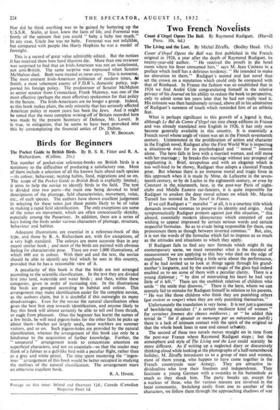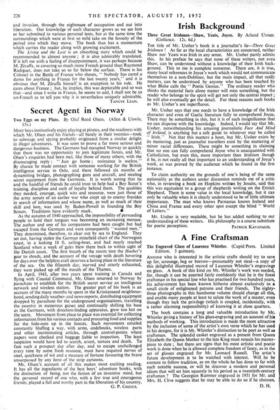Two French 'Novelists
The Living and the Lost. By Michel Zeraffa. (Bodley Head. I5s.) Count d'Orgel Opens the Ball was first published in the French original in 1924, a year after the death of Raymond Radiguet, its twenty-year-old author. "He received the proofs in he hotel room where his fever consumed him," says M. Jean Cocteau in a preface which itself has a delirious tendency. " He intended to make no alteration to them." Radiguet 's second and last novel thus set the crown on a reputation which could only be compared with that of Rimbaud. In France the fashion was so established that in 1924 we find Andre Gide congratulating himself in the relative privacy of his Journal on his ability to reduce the book to perspective, only to admit some ten years later that he had not really read it. His estimate was then handsomely revised, above an in his admiration of Radiguet 's sureness of touch which reminded him of an athletic feat.
What is perhaps significant in this growth of a legend is that, although Le Bal du Comte d'Orgel ran into cheap editions in France and was already translated into English in 1926, it has only now become generally available in this country. it is essentially a French novel whose angle of vision was set in the French seventeenth century. Uninterested in the proliferation of action and character in the English novel, Radiguet after the First World War is inspecting a situation ed trois for its psychological and " moral " interest alone. The hero falls in love with a married woman, and still more with her marriage ; he breaks this marriage without any prospect of supplanting it. Brief, scrupulous and with an elegance which is too well-bred to be showy, Radiguet thus adopts a classical French pose. But whereas there is an immense moral and tragic force in this approach when it is made by Mme. de Lafayette in the seven- teenth century, or by de Laclos in the eighteenth century, or even by Constant in the, nineteenth, here, in the post-war Paris of night- clubs and Middle Eastern car-fanciers, it is quite impossible for Radiguet to awaken the deep moral echoes on which Mr. Martin Turnell has insisted in The Novel in France.
If we call Radiguet a" moralist "at all, it is a courtesy title which demands inverted commas to preserve its identity and origin. And symptomatically Radiguet protests against just this situation, " this absurd, essentially modern idiosyncrasy which consisted of not wishing to appear impressed by certain serious words and certain respectful 'formulae. So as to evade being responsible for them, one pronounces them as though between inverted commas." But, alas, it is not the words of the formulae which fail to impress us so much as the attitudes and situations to which they apply.
If Radiguet fails to find any new formula which might fit the contemporary scene, we must remember what is the standard of measurement we are applying to this boy who died on the edge of manhood. There is something a little eerie about the performance, as if he had invited us to look at things again through his grand- mother's lorgnette, and by the ancient magic of the glass had indeed enabled us to see some of them with a peculiar clarity. There is a young diplomat ; "by dint of mistrusting his heart he had very little of it left." There are the snobbish relatives of children who smile "the smile that disowns." There is the hero, whom we can scarcely fail to mistake for Radiguet himself in relation to his parents. "He was like those children who think they are punishing others (qui croient se venger) when they are only punishing themselves."
Unfortunately the translation is very loose. It is not just a question of bewildering mistakes (" a certain mediocre kind of women" for certaines femmes des classes mediocres ; or "he added this trivial lie" for il cdoutait ce mensonge par un mecanisme puiril); there is a lack of intimate contact with the spirit of the original so that the whole book loses in ease and casual urbanity.
The second of these two novels moves straight on in time from the post-war France where Raymond Radiguet stops ; but the atmosphere and style of The Living and the Lost could scarcely be more different. As if writing up a neglected diary or discursively thinking aloud while looking at the photographs of a half-remembered holiday, M. Zoraffa introduces us to a group of men and women, most of them young, who happen to have come together in the French countryside near Annecy. They are attractive in- dividualists who love their freedom and independence. They fascinate a young German with a- swastika in his buttonhole as much as they shock him. The party breaks up, except for a nucleus of three, who for various reasons are involved in the local community. Switching easily from one to another of the characters, we follow them through the approaching shadows of war and invasion, through the nightmare of occupation and out into liberation. Our knowledge of each character grows as we see him or her submitted to various personal tests, but at the same time the surroundings which were at first so mild take on the ferocity of the period into which they move. The book thus has a momentum which carries the reader along with growing excitement.
The Living and the Lost is an absorbing story which could be recommended to almost anyone ; it is also admirably translated. If it left me with a feeling of disappointment, it was perhaps because M. Zeraffa, in covering so much more French ground than Raymond Radiguet, does not take us so far below the surface. There is his Colonel in the Battle of France who shouts, "Nobody has cared a damn for anything in France for the last twenty yeas," and it is obvious that M. Zeraffa himself is an exception to his rule. He cares about France ; but, he implies, this was deplorable and so was that—and since I write in France, he seems to add, I shall not be so un-French as to tell you why it is nevertheless uniquely admirable.
TANGYE LEAN.



























 Previous page
Previous page